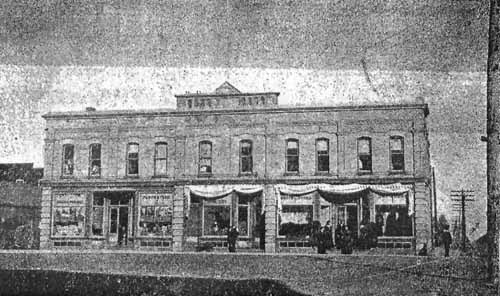Levi Beck was born in Salem, Wellington County, Ontario, December 13, 1860, son of Adam Beck, a native of Germany and Eliza (Speers) Beck from Ireland.
When Beck came west in 1883, he worked in Pultney and Portage la Prairie, Manitoba, before he took up farming a few kilometers east of Yorkton. In 1888, he filed for homestead and a pre-emption quarter section that had been undeveloped by the York Farmers Colonization Company Agent R.N. Taylor. He also purchased land from the Company. Shortly after, he contracted with the Manitoba and Northwestern Railroad to grade a stretch of their right-of-way in the area leading to Yorkton.
He eventually owned several sections of land.
Levi married Alice Pearce in February of 1891. Harriet Jane Alice was born in Ontario, the daughter of Yorkton pioneers William and Mary Pearce. The Manitoba Daily Free Press reported on their wedding: "A goodly company assembled at the residence of Mr. W. Pierce, near Armstrong Lake, on Thursday last to witness the marriage of Mr. Pierce's daughter, Miss Alice to Mr. Levi Beck. Rev. John Peters of Saltcoats was the officiating clergyman. Miss Olive Pierce, sister of the bride, and Mr. C. Beck brother of the bridegroom, supported the happy couple during the ordeal. Many guests from Yorkton, Armstrong Lake, Wallace and Saltcoats were in attendance to witness the ceremony, partake in the well-served wedding breakfast and otherwise testify to their esteem for Mr. And Mrs. Beck."
After their marriage the Becks moved to Yorkton, although they kept on farming, and ranching. In town they opened a boarding house, which was across the Yorkton Enterprise building on Third Avenue North. Within a few years Levi was owner of the J. Smith flour mill, which still stands today, an implement dealership, a butcher shop, a harness shop, a confectionary, a bakery, a lumberyard, a large general store built on Broadway Street East in 1896. He was also owner of grain elevators in Yorkton and in Otthon.
The following is a record of Beck's assets for year 1900 --ASSESSMENT ROLL OF THE TOWN OF YORKTON Levi & Alice Beck, early 1900s.
B14 $400.00
L1 B3 $200.00
Stable L3.4 B3 $800
Lot 5 B3 $600.
Lots 21, 22, 24 B3 $375.
Lot 30, B7 $150.
I acre Betts farm $60.00
Butcher Shop $950.00
Shack $200.
Stock $10,000
Livery Stable - $400.00
Implement warehouse $400.00
Pearson's house $400.00
Kilborne House - $800.00
Frame House $950.00
Block $7,000.00
Lot 21, 22 Blk 4 $300.00
14 horses $1,250.00
2 cows $60.00
Rigs & harness $100.00
Implements $1,000.00
L 9.10, B4 - $150.00
L 16, 17 B5 - $150.00
He invented a trading dollar, a round disk with the caption "Levi Beck One Dollar," which was exchangeable at his store. Alice, who managed the boarding house, matched her husband's enthusiasm for hard work and hospitality. In 1902, the Becks built a spacious home facing Smith Street, between First and Second Avenue.
In 1926, as he was retiring from farming, he held an auction sale of 80 head of horses and equipment for 3,000 acres of land. The auction was held at his Hill Farm at SW Section 35 township 25 Range 4 West of the 2nd Meridian. Hill Farm was in the area off Logan Crescent West.
With the Depression beginning in 1929, he began having financial woes. In 1931, the Rural Municipality of Cana had moved to proceed with the seizure of his Otthon elevator. The City of Yorkton Archives have a letter dated Nov. 7, 1932 signed by John J. Cook then manager of the York Farmers Colonization Company Limited of Toronto, addressed to Levi Beck regarding a half section: W1/2 Section 5 Township 26 Range 3 West of the Second Meridian. This was land he had purchased from the Company. Levi had written to explain the hard times, and that he had received an offer to purchase the land, paying $3,000.00 cash, the balance on terms. The Company was writing back, appreciating Beck's difficulties and wanting to know if the purchaser was a reliable man.
Levi Beck died in 1936, his wife in 1947.
Levi Beck was an example of the consummate business man, he sought to make profits, and was willing to invest that money in numerous enterprises, as well as being a socially responsible individual. He was known as a generous man. He also took time out for civic duties, serving as mayor in 1912-13. He was a very active member of the Board of Trade. So prominent was he in the business foundations of the community, he was dubbed: "The Merchant Prince of Yorkton."
The Beck mansion was demolished in 1957 to make way for the building of the Fire Hall.
Contact:
Terri Lefebvre Prince,
Heritage Researcher
City of Yorkton Archives,
City of Yorkton,
Box 400,
37 Third Avenue North,
Yorkton, Sask.
S3N 2W3
306-786-1722
historian@yorkton.ca



